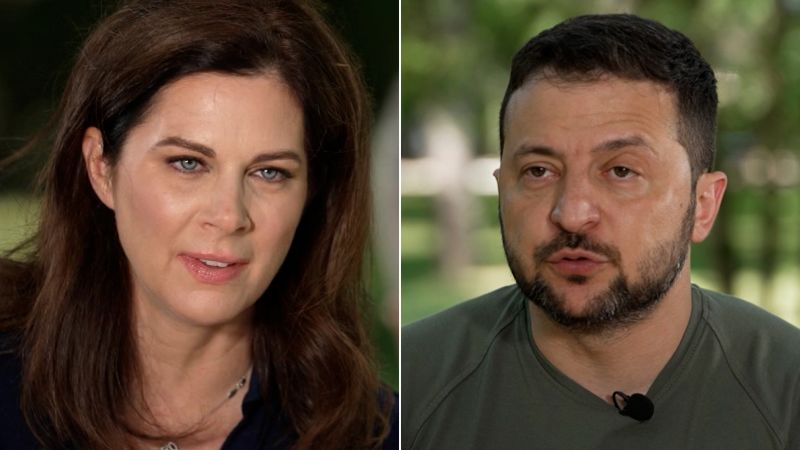
Exclusive: Zelensky says he wanted counteroffensive to start ‘much earlier’ to pre-empt Russian defenses
“I’m grateful to the US as the leaders of our support,” he told Burnett through a translator, “but I told them as well as the European leaders that we would like to start our counteroffensive earlier, and we need all the weapons and materiel for that. Why? Simply because if we start later, it will go slower.”
The Ukrainian leader added that difficulties on the battlefield were now leading to a “slowed down” counteroffensive.
“I wanted our counteroffensive to happen much earlier, because everyone understood that if the counteroffensive unfolds later, then a bigger part of our territory will be mined. We give our enemy the time and possibility to place more mines and prepare their defensive lines.”
Ukrainian officials have repeatedly said that while the counteroffensive is under way, the main push is yet to come.
Deputy Minister of Defense Hanna Maliar said last month that Ukraine was holding back some of its reserves and that the “main strike” was still ahead.
In any direction Ukraine chooses to attack, however, time is the enemy, Zelensky told Burnett. “The later we start, the more difficult it will be for us.”
As he has done so often since Russia launched its full-scale invasion of Ukraine in February 2022, the president pleaded with Western governments to give Kyiv more advanced weaponry – such as the US-made long-range Army Tactical Missile Systems – now rather than later.
“In some directions it will give us an opportunity to start the counteroffensive,” he said. “In some directions we cannot even think of starting it, as we don’t have the relevant weapons. And throwing our people to be killed by Russian long-range weapons would be simply inhumane.”
He also re-emphasized his plea for American-made F-16 fighter jets. The United States has authorized its allies to begin training Ukrainian pilots to fly those aircraft, but has not yet allowed allies to re-export those planes to Ukraine.
“It’s not even about the Ukrainian advantage in the sky over the Russians,” Zelensky said. “This is only about being equal. F-16s help not only those on the battlefield to move forward. It is simply very difficult without cover from the air.”
‘Where did Putin go?’
Burnett’s interview with Zelensky comes at a crucial moment – weeks into Ukraine’s counteroffensive, but also in the wake of Wagner’s armed rebellion in Russia last month.
He also suggested that the Russian leader had been notably out of public sight since the secretive Kremlin deal that ended Wagner’s chaotic insurrection.
“After all these events, where did Putin go?” Zelensky said. “He rarely comes outside to the street. We see him in his offices, etc., but we never see him out and about.”
He claimed that Ukrainian intelligence indicated that the Kremlin was measuring support for Prigozhin. “Half of Russia supported Prigozhin. Half of Russia supported Putin,” Zelensky said. “Some of the Russian regions were balancing in the meantime without knowing for sure who to support.”
‘Alone I can be with music’
That Zelensky has a stressful job is certainly not in doubt. He’s running a war effort, motivating citizens and allies alike, and trying to avoid near-constant assassination attempts.
“I’ll be honest with you,” he told Burnett. “If I were thinking about it constantly I would just shut myself down, very much like Putin now who doesn’t leave his bunker.”
The constant threats on his life, Zelensky said, don’t bother him.
“You can put yourself in a cage like an animal and chain yourself there, constantly thinking that you are just about to get killed. Of course, my bodyguards should think how to prevent this from happening, and this is their task. I don’t think about it.”
Switching to English, Zelensky told Burnett that he values the solitary moments.
“Alone I can be with music, it’s true, or with a book. And early, early in the morning, when there are no sounds, no people, nobody.
“I can just read. Think, think. And the music helps really.”
Burnett asked him what his favorite music was.
“I like AC/DC. And Ukrainian music – of course, I like Ukrainian music a lot, because Ukraine is (my) native language. That’s why you understand not only music, you understand (the) words. AC/DC, I don’t understand all the words. I like (the) energy of AC/DC.”
A workout at six or seven in the morning, to the beat of AC/DC, he said, “gives you energy for all the day.”
